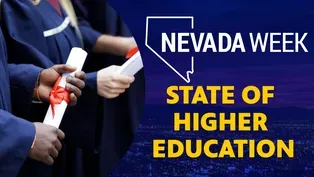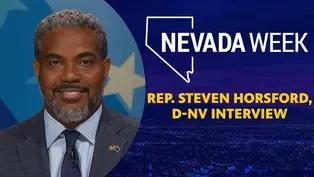
Rep. Steven Horsford Interview
Clip: Season 5 Episode 32 | 8m 43sVideo has Closed Captions
We talk with Rep. Steven Horsford about Tyre Nichols case and more.
We talk with Rep. Steven Horsford about Tyre Nichols case and more.
Problems with Closed Captions? Closed Captioning Feedback
Problems with Closed Captions? Closed Captioning Feedback
Nevada Week is a local public television program presented by Vegas PBS

Rep. Steven Horsford Interview
Clip: Season 5 Episode 32 | 8m 43sVideo has Closed Captions
We talk with Rep. Steven Horsford about Tyre Nichols case and more.
Problems with Closed Captions? Closed Captioning Feedback
How to Watch Nevada Week
Nevada Week is available to stream on pbs.org and the free PBS App, available on iPhone, Apple TV, Android TV, Android smartphones, Amazon Fire TV, Amazon Fire Tablet, Roku, Samsung Smart TV, and Vizio.
Providing Support for PBS.org
Learn Moreabout PBS online sponsorship-Welcome to Nevada Week .
I'm Maria Silva, in for Amber Renee Dixon while she is on maternity leave.
Thank you so much for joining us.
We'll sit down with the presidents of two of Southern Nevada's institutions of higher education to get their take on the state of higher ed.
That's in a moment.
But first, before taking her leave, Amber spoke with Congressman Steven Horsford, following President Biden's State of the Union address to get his take on renewed calls for Congress to enact police reform.
(Amber Renee Dixon) Congressman, at the State of the Union, you hosted the parents of Tyre Nichols, the man who died after being brutally beat by police.
What was that experience like for you, having his parents as your guests?
(Rep. Steven Horsford) Well, I had the responsibility as the chair of the Congressional Black Caucus to call the family to extend our condolences, to let them know that we stand with them for justice for their son.
And that's why now we are working to, as the President said, move our country forward around public safety and accountability so that all of our communities are safe throughout the country.
-And in an interview following the State of the Union, Tyre Nichols' mother said that she found President Biden's message to be very strong, she appreciated it, but that she needs action more than messaging.
-And I'm wondering though, after having witnessed firsthand some of the discord between President Biden and some members of Congress at that address, the heckling and booing, how much confidence does she have that Congress can get something done?
-Well, after the State of the Union, I actually went and escorted Mrs. Wells, the mother of Tyre Nichols, from the gallery.
And in the course of leaving the Capitol, several members from both sides of the aisle came up to her and said, you know, We're praying for you.
We're lifting you and your family up in prayer.
And she said, What I need more than your prayer is I need your action.
And Amber, you're right.
There may be discord and dysfunction with some members of Congress, but those members were never about solving problems.
The issue of public safety is not a Democrat or Republican issue.
It's not a Black, Brown or White issue.
It is a public safety and accountability issue that all of us should be working for.
And all of us should agree that bad policing shouldn't exist anywhere in America.
So yes, there are Republicans, I am meeting and talking with many of them in the Senate and the House, who were not part of the hecklers, who actually believe in public safety for all communities.
And we're going to work tirelessly to reach agreement so that we can move meaningful legislation ahead this Congress.
It's going to be hard, but we're going to work hard to get it done.
-What do you anticipate being most hard about it?
-Well, look, a lot of times people have tried to frame this issue as, if you are against bad policing, then somehow that means you're against all police.
I want to say without a doubt, I support law enforcement.
In fact, as the President said, The lion's share of law enforcement, the men and women who put on the uniform and go into our communities to protect and serve, are good people that work hard and do the right thing.
And they want to be able to come home to their families, as well.
But where there is bad policing--and again, none of us should want that anywhere in America--then we have to work to hold them accountable.
It's going to be hard to make sure that this doesn't become about rhetoric, that it doesn't become about a provision of law, but it becomes about the heart of what President Biden spoke to, which is that difficult talk that too many parents have to have with their children, particularly Black and Brown parents who are disproportionately affected by this.
And that's one of the most difficult things that we have to do as parents.
And that's what we're trying to say.
We want all communities to be safe, including the communities that we live in and come from.
-In the discussions that you've been having so far with the President and then, as you just mentioned, some other Republicans as well, what kind of legislation are you pursuing?
-Well, what we are doing at this moment is talking about the principles of public safety and accountability.
So for example, on transparency, that's about data collection.
In Memphis, for example, the use of force was used three times more on Black residents in Memphis than on White residents.
The only reason we know that is because they collect data.
Well, there's 18,000 police departments across the country.
We need that data for all of those departments.
Secondly, we need more accountability.
When there is wrongdoing, there needs to be a mechanism by which individuals are held accountable, or departments are held accountable.
And there needs to be teeth in those accountability provisions.
And finally, it's about professional standards.
And that goes to helping law enforcement with what they need.
I agree with the President that sometimes we ask law enforcement to do more than they even want to do.
We need to support them with community based intervention, mental health support, social workers so that they're not having to deal with all of societal issues, they are able to focus on ways to keep our community safe.
-And back to something you mentioned about this not being a Black, Brown, or White issue.
Yet also, you said that it disproportionately impacts Black and Brown families.
Is this an issue of race in your opinion?
-Well, what I-- I know this: As a Black man that was born and raised in Las Vegas, and as a father now of three children, two grown, soon to be grown young men, and a teenage daughter, it's important for people to understand what the President said: That there's a burden that Black and Brown families have, especially.
It's not to the exclusion of others.
And what I've tried to say for people to really understand is, it may have fear and anxiety for me today, but that doesn't mean it's to the exclusion of other people.
It may have been Tyre Nichols yesterday, but it could be anyone today or tomorrow.
And so all of us should be willing to come together for public safety and accountability in every community.
-And finally, from the local perspective, I wonder what you hear in terms of how prevalent police brutality is in the district you serve here in Nevada.
-Well, clearly, we've had our issues in Nevada and in Las Vegas.
I'm pleased with the progress that we've made over the years since the 21st Century Policing Commission was put into place back when President Obama was President.
I actually helped bring then Director Davis over the COPS program to work with local law enforcement.
I want to commend our local sheriff and local law enforcement agencies throughout our communities, including in North Las Vegas, for recognizing that, again, this is an issue that they have a responsibility, because it's their profession.
I've heard from a number of police officers about the difficulty to recruit people into the profession.
And part of that is because of this stigma right now.
And I want, again, to make it absolutely clear: We need and support our law enforcement.
I've worked to fund law enforcement in our local community, and I'll continue to do so.
And I believe that I can both work to fund law enforcement, while also making sure that bad policing has no place in any law enforcement agency in my district or anywhere else in America.
-Congressman Horsford, Chairman of the Congressional Black Caucus, thank you so much for your time.
-Thank you, Amber.
Video has Closed Captions
Clip: S5 Ep32 | 16m 44s | We talk with CSN’s Federico Zaragoza and NSC’s DeRionne Pollard about higher ed. (16m 44s)
Rep. Steven Horsford, D-NV Interview
Video has Closed Captions
Clip: S5 Ep32 | 12m 10s | We speak with Rep. Steven Horsford about the State of the Union address (12m 10s)
Providing Support for PBS.org
Learn Moreabout PBS online sponsorshipSupport for PBS provided by:
Nevada Week is a local public television program presented by Vegas PBS













